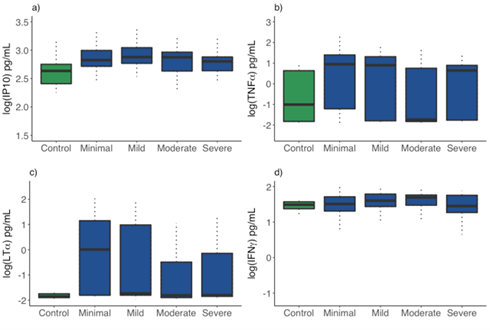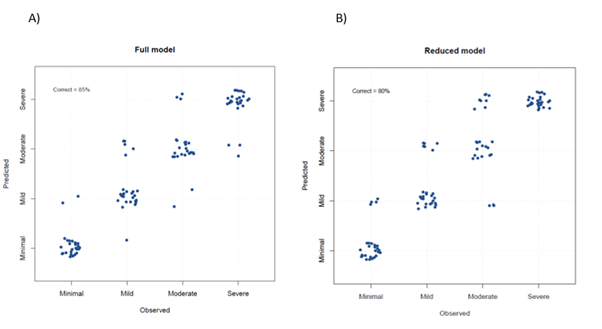Session Information
Session Type: ACR Poster Session A
Session Time: 9:00AM-11:00AM
Background/Purpose: Primary Sjögren’s syndrome (pSS) is a chronic autoimmune rheumatic disease causing various symptoms including dryness, fatigue and pain. Previous work by our group has suggested that certain pro-inflammatory cytokines are inversely related to patient-reported levels of fatigue. This model in that study using pro-inflammatory cytokine levels, disease-specific and clinical parameters was able to predict fatigue with 67% accuracy. To date, these findings have not been validated. This study aims to validate this observation.
Methods: Blood levels of seven cytokines were measured in 120 patients with pSS from the United Kingdom Primary Sjögren’s Syndrome Registry and 30 age-matched healthy non-fatigued controls. Patient-reported scores for fatigue were classified according to severity and compared to cytokine levels using analysis of variance. The differences between cytokines in cases and controls were evaluated using Wilcoxon test. A logistic regression model was used to determine the most important predictors of fatigue.
Results: Three cytokines, interferon-γ-induced protein-10 (IP-10), tumour necrosis factor-α (TNFα) and interferon-α (IFNα) were significantly higher in patients with pSS (n=120) compared to non-fatigued controls (n=30). Levels of two pro-inflammatory cytokines, TNF-α (p=0.021) and lymphotoxin-α (p=0.043), were inversely related to patient-reported levels of fatigue. Based on the model previous used a regression model was created to predict fatigue in pSS. Cytokine levels, disease-specific and clinical parameters as well as pain, anxiety and depression were used as predictors in this validation model. The model correctly predicts fatigue levels with 85% accuracy.
Conclusion: Depression, pain and proinflammatory cytokines appear to be the most powerful predictors of fatigue in pSS, which is consistent with the original study. This data further challenges the notion that proinflammatory cytokines directly mediate fatigue in chronic immunological conditions. Validation in an independent international cohort would be necessary to further confirm these results.
Figure 1: Box plot showing median cytokine levels and IQR for a) IP-10, b) TNF-α, c) LT-α and d) IFN-γ in controls and pSS fatigue groups.
Figure 2: (A) Full ordinal logistic regression model with all parameters. All of these variables predict fatigue correct in 85% of cases. (B) shows that IFN-γ, IP-10, depression and pain alone predicted fatigue level with 80% accuracy.
To cite this abstract in AMA style:
Davies K, Mirza K, Tarn J, Howard Tripp N, Moots RJ, Gendi N, Bombardieri M, Pitzalis C, Sutcliffe N, Bowman S, McHugh NJ, McLaren J, Mewar D, Coady D, MacKay K, Knight S, Gupta M, Regan M, Lawson C, Andrews J, Lanyon P, Akil M, Price E, Cooper A, Hall F, Dimitroulas T, Clunie G, Vadivelu S, Giles I, Dasgupta B, Young-Min S, Lendrem D, Ng WF. Fatigue in Primary Sjögren’s Syndrome (pSS) Is Associated with Lower Levels of Proinflammatory Cytokines: A Validation Study [abstract]. Arthritis Rheumatol. 2017; 69 (suppl 10). https://acrabstracts.org/abstract/fatigue-in-primary-sjogrens-syndrome-pss-is-associated-with-lower-levels-of-proinflammatory-cytokines-a-validation-study/. Accessed .« Back to 2017 ACR/ARHP Annual Meeting
ACR Meeting Abstracts - https://acrabstracts.org/abstract/fatigue-in-primary-sjogrens-syndrome-pss-is-associated-with-lower-levels-of-proinflammatory-cytokines-a-validation-study/


